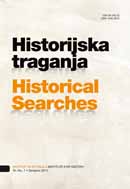O POČECIMA DJELOVANJA HRVATSKE NARODNE ZAJEDNICE I HRVATSKE KATOLIČKE UDRUGE U PARLAMENTARNIM UVJETIMA
ON THE BEGINNING OF FUNCTIONING OF THE CROATIAN NATIONAL COMMUNITY AND THE CROATIAN CATHOLIC UNION IN PARLIAMENTARY CONDITIONS
Author(s): Zoran GrijakSubject(s): History
Published by: Institut za istoriju
Keywords: Bosnia and Herzegovina; Austro-Hungarian Monarchy; Constitution 1910; The Parliament of Bosnia and Herzegovina; Croatian National Community; Croatian Catholic Union; Muslim National Organization; Muslim Independent Party; Serb National Organization
Summary/Abstract: The instituting of parliamentarism in Bosnia and Herzegovina in 1910 had important consequences for the shaping of Croat and Muslim politics until the break out of the First World War (1914) and the dissolution of the Parliament of Bosnia and Herzegovina in February of 1915. Namely, the fact that the parliamentary system was based on the confessional principle brought about the need for the swift re-ordering of parties according to this principle. This was already achieved in Serbian politics, while in the Croat and Muslim politics the tradition of equating of the religious and national belonging would be politically institutionalized only in 1910, after this was done in the Draft of the Constitution, with the founding of the Croatian Catholic Union (HKU) and the Muslim Independent Party (MSS). The founding of the HKU initiated a big divide in Croat politics in Bosnia and Herzegovina because the secular intelligentsia and the Franciscans in the Croatian National Community (HNZ) declined the compromise with HKU by which they would support its religious profile. Despite the fact that the Draft of the Constitution predicted a confessional electoral body, they continued to insist on the inter-confessional component of HNZ’s programme. The reasons which moved archbishop Stadler to establish the HKU were conditioned by the fact that the Croatian national process in Bosnia and Herzegovina was not yet finished and that its progress could be threatened if it was to be placed onto inter-confessional foundations. He was also motivated by the fact that the leadership of the HNZ refused to include the Catholic immigrants in the Monarchy into the Croatian politics, as well as by the circumstance that the leadership of the HNZ was more in favour of cooperation with the Serbs, which stood in contrary to the Programme of the Right from 1894 which was supported by the HNZ and the HKU. Opposite to the divide in Croatian politics in Bosnia and Herzegovina, the Muslim politics were homogenized on the basis of religion due to the establishing of the MSS which was now supported by a pro-Croat part of Muslim intelligentsia from the MNS. The compromise between HNZ and HKU was reached only in 1912 after the open support of the Muslim and Serb clubs in the Parliament for the autonomy of Bosnia and Herzegovina and the resolute refusal of HNZ’s and HKU’s attempts to unite Bosnia and Herzegovina with Croatia in a “trialist” Monarchy. This compromise did not, however, last very long because the break down of the Right organization and the return to power of the Croat-Serb coalition in Croatia in 1913 brought about a new predominance of the supporters of Croat-Serb cooperation in the leadership of the HNZ. This would influence archbishop Stadler to seek political support for the unification of Croatian lands with Bosnia and Herzegovina in a Great-Austrian trialist circle around the crown prince archduke Franz Ferdinand.
Journal: Historijska traganja
- Issue Year: 2011
- Issue No: 07
- Page Range: 73-117
- Page Count: 45
- Language: Croatian

